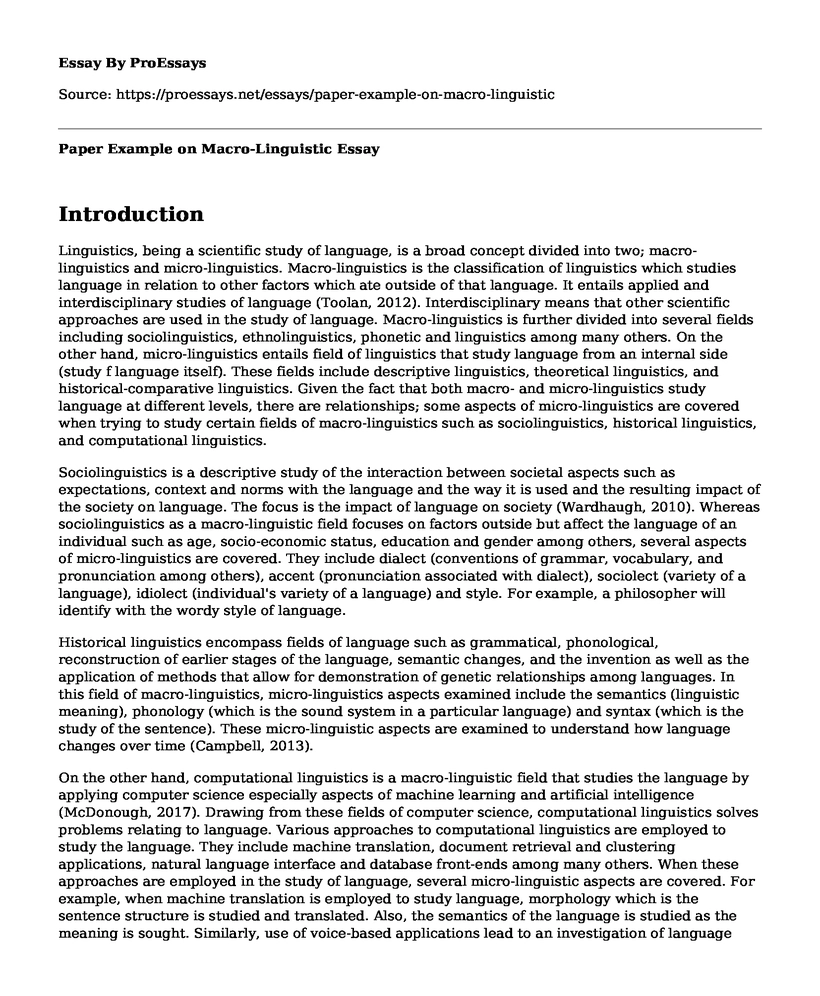Introduction
Linguistics, being a scientific study of language, is a broad concept divided into two; macro-linguistics and micro-linguistics. Macro-linguistics is the classification of linguistics which studies language in relation to other factors which ate outside of that language. It entails applied and interdisciplinary studies of language (Toolan, 2012). Interdisciplinary means that other scientific approaches are used in the study of language. Macro-linguistics is further divided into several fields including sociolinguistics, ethnolinguistics, phonetic and linguistics among many others. On the other hand, micro-linguistics entails field of linguistics that study language from an internal side (study f language itself). These fields include descriptive linguistics, theoretical linguistics, and historical-comparative linguistics. Given the fact that both macro- and micro-linguistics study language at different levels, there are relationships; some aspects of micro-linguistics are covered when trying to study certain fields of macro-linguistics such as sociolinguistics, historical linguistics, and computational linguistics.
Sociolinguistics is a descriptive study of the interaction between societal aspects such as expectations, context and norms with the language and the way it is used and the resulting impact of the society on language. The focus is the impact of language on society (Wardhaugh, 2010). Whereas sociolinguistics as a macro-linguistic field focuses on factors outside but affect the language of an individual such as age, socio-economic status, education and gender among others, several aspects of micro-linguistics are covered. They include dialect (conventions of grammar, vocabulary, and pronunciation among others), accent (pronunciation associated with dialect), sociolect (variety of a language), idiolect (individual's variety of a language) and style. For example, a philosopher will identify with the wordy style of language.
Historical linguistics encompass fields of language such as grammatical, phonological, reconstruction of earlier stages of the language, semantic changes, and the invention as well as the application of methods that allow for demonstration of genetic relationships among languages. In this field of macro-linguistics, micro-linguistics aspects examined include the semantics (linguistic meaning), phonology (which is the sound system in a particular language) and syntax (which is the study of the sentence). These micro-linguistic aspects are examined to understand how language changes over time (Campbell, 2013).
On the other hand, computational linguistics is a macro-linguistic field that studies the language by applying computer science especially aspects of machine learning and artificial intelligence (McDonough, 2017). Drawing from these fields of computer science, computational linguistics solves problems relating to language. Various approaches to computational linguistics are employed to study the language. They include machine translation, document retrieval and clustering applications, natural language interface and database front-ends among many others. When these approaches are employed in the study of language, several micro-linguistic aspects are covered. For example, when machine translation is employed to study language, morphology which is the sentence structure is studied and translated. Also, the semantics of the language is studied as the meaning is sought. Similarly, use of voice-based applications lead to an investigation of language phonology as the sound system is focused as the main area of study of language.
References
Campbell, L. (2013). Historical linguistics. Edinburgh University Press.
McDonough, S. (2017). Applied linguistics in language education. Routledge.
Toolan, M. (2012). Narrative: A critical linguistic introduction. Routledge.
Wardhaugh, R. (2010). An introduction to sociolinguistics. John Wiley & Sons.
Cite this page
Paper Example on Macro-Linguistic. (2022, May 22). Retrieved from https://proessays.net/essays/paper-example-on-macro-linguistic
If you are the original author of this essay and no longer wish to have it published on the ProEssays website, please click below to request its removal:
- Availability of Birth Control in Schools Essay
- Experience of 10 Days of Meditation Paper Example
- Compare and Contrast Essay on Online Education Versus Traditional Education
- Essay on Brown and Levinson's Framework: Advancing Human Speech & Communication
- Essay Sample on Mental Health Issues in College: A Global Challenge
- Article Analysis Essay on College a Waste of Time and Money: Caroline Bird's Argument
- Essay Example on Be the Best: My Aspiration as House Captain of XXXX House







